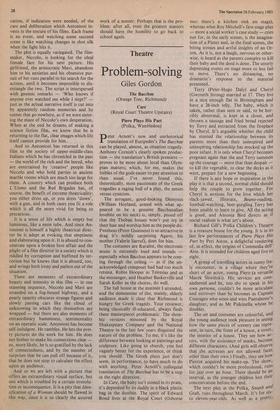Cinema
Unreal images
Peter Ackroyd
Identification of a Woman (`18', Camden Plaza)
This, we are told, is the first film which Michelangelo Antonioni has set in Italy for some 20 years; it is a kind of homecom- ing and, appropriately enough, it begins with an Italian film-maker returning to his apartment after a journey. After the video- electronic tricks of Antonioni's last film, The Oberwald Mystery, we are all agog: will the screen flash red, blue and orange as soon as he opens the door? In fact he enters what is very much 'the Antonioni room', a conflation of de Chirico and Bugatti: the red sofa, the white walls, the large window with a curtain blowing across it and, somewhere in the foreground, a solitary figure.
Even if you don't remember the films, you will remember the look. It is now as much part of cinematic history as the mov- ing skies of Spielberg or the gloomy land- scapes of Bergman. And the colours are, as always, wonderful: bleached out so that the scene resembles a Roman mosaic, or shinily iridescent like wax fruit. They are an indi- cation, if indication were needed, of the care and deliberation which Antonioni in- vests in the texture of his films. Each frame is an event, and watching scene succeed scene is like watching changes in shot silk when the light hits it.
The plot is equally variegated. The film- maker, Niccolo, is looking for the ideal female face for his next picture. His girlfriend, the aristocratic Mavi, abandons him to his anxieties and his obsessive pur- suit of her runs parallel to his search for the actress, until it becomes impossible to dis- entangle the two. The script is interspersed with gnomic remarks — 'Who knows if anyone ever watched me while I slept?' just as the actual narrative itself is cut into by apparently random memories and by scenes that go nowhere, as if we were enter- ing the maze of Niccolo's own desperation. When at the end he dreams of making a science fiction film, we know that he is returning to the flat, clear images which life itself cannot provide for him.
And so Antonioni has returned in this film to the society of upper-middle-class Italians which he has chronicled in the past — the world of the rich and the bored, who are entertained by 'creative' people like Niccolo and who hold parties in ancient marble rooms which are much too large for them. A country which can produce both L 'Uomo and the Red Brigades has, of course, the benefit of extreme theatricality: you either dress up, or you dress 'down', with a gun, and in both cases you fit a role which is all the more vivid for being so precarious.
It is a sense of life which .is empty but luminous, like a neon tube. And since An- tonioni is himself a highly theatrical direc- tor he is adept at evoking that emptiness and elaborating upon it. It is absurd to con- centrate upon a broken love affair and the plight of a film director in a society which is riddled by corruption and buffeted by ter- rorism but he knows that it is absurd, too, and wrings both irony and pathos out of the situation.
There are moments of extraordinary beauty and intensity in this film — in one stunning sequence, Niccolo and Mavi are stranded on a fog-bound highway, and a pearly opacity obscures strange figures and slowly passing cars like the cloud of unknowing in which they themselves are wrapped — but there are also moments of extraordinary hamminess, sentimentality on an operatic scale. Antonioni has become self-indulgent. He rambles. He lets the pret- ty pictures do the work for him. He does not bother to make his connections clear or, more likely, he is so gratified by the lack of connectedness, and by the number of surprises that he can pull off because of it, that he does not stop to calculate the effect upon an audience.
And so we are left with a picture that offers an extraordinary visual surface, but one which is troubled by a certain irresolu- tion or inconsequence. It is a pity that Iden- tification of a Woman should be flawed in this way, since it is so clearly the assured
work of a master. Perhaps that is the pro- blem: after all, even the greatest masters should have the humility to go back to school again.











































 Previous page
Previous page